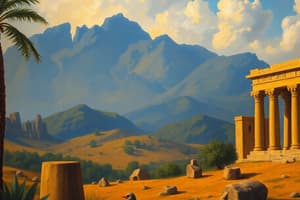Podcast
Questions and Answers
Which ancient civilization is known for their architectural masterpieces like pyramids and colossal temples?
Which ancient civilization is known for their architectural masterpieces like pyramids and colossal temples?
- Greeks
- Egyptians (correct)
- Mesopotamians
- Indus Valley Civilization
Which ancient civilization saw the rise of Hammurabi with his codex of laws?
Which ancient civilization saw the rise of Hammurabi with his codex of laws?
- Mesopotamians (correct)
- Egyptians
- Indus Valley Civilization
- Chinese
In which ancient civilization was Enheduanna, the first attested poet and priestess in written history?
In which ancient civilization was Enheduanna, the first attested poet and priestess in written history?
- Mesopotamians (correct)
- Indus Valley Civilization
- Greeks
- Egyptians
Which ancient civilization was centered along the Indus River valley system?
Which ancient civilization was centered along the Indus River valley system?
Which ancient civilization had complex urban centers like Memphis and Thebes?
Which ancient civilization had complex urban centers like Memphis and Thebes?
Which ancient civilization contributed to mathematics, astronomy, literature, and lawmaking?
Which ancient civilization contributed to mathematics, astronomy, literature, and lawmaking?
Which ancient civilization is known for its advanced understanding of hydrology, engineering, sanitation, and urban design?
Which ancient civilization is known for its advanced understanding of hydrology, engineering, sanitation, and urban design?
Which civilization nurtured exceptional developments in politics, philosophy, drama, poetry, and sciences during its peak period?
Which civilization nurtured exceptional developments in politics, philosophy, drama, poetry, and sciences during its peak period?
What famous event was birthed by Greek athletic endeavors dating back to 776 BCE?
What famous event was birthed by Greek athletic endeavors dating back to 776 BCE?
Which civilization is known for its excellence in areas like military strategy, infrastructure development, lawmaking, and accounting?
Which civilization is known for its excellence in areas like military strategy, infrastructure development, lawmaking, and accounting?
During which period did Greece nurture famous figures like Plato, Aristotle, and Archimedes who made essential contributions to humanity's knowledge base?
During which period did Greece nurture famous figures like Plato, Aristotle, and Archimedes who made essential contributions to humanity's knowledge base?
Which ancient civilization is associated with cities like Mohenjo-daro and Harappa that flourished due to its advanced urban design?
Which ancient civilization is associated with cities like Mohenjo-daro and Harappa that flourished due to its advanced urban design?
Flashcards are hidden until you start studying
Study Notes
Delving into Human History through Ancient Civilizations
Throughout time, humankind has built diverse societies known as ancient civilizations. These remarkable communities left indelible marks on our world's history, shaping everything from art and architecture to science and philosophy. Let's embark on a journey exploring some of these extraordinary periods.
Egypt (c. 3100 BCE – c. 332 BCE)
The Nile River basin was home to one such civilization—Egyptians. Known for their architectural masterpieces like pyramids and colossal temples, they established intricate religious and social systems characterized by hieroglyphs and mummification practices. Their agricultural prowess enabled them to sustain a population that grew around complex urban centers like Memphis and Thebes.
Mesopotamia (Sumerian and Babylonian Periods; c. 4000 BC - 539 BC)
Mesopotamia encompassed two river valleys stretching across modern Iraq and parts of Syria. This region saw the rise of Sumerians and later Babylonians whose contributions ranged from agriculture, trade, and city planning to mathematics, astronomy, literature, and lawmaking. Some notable figures were Hammurabi with his codex of laws and Enheduanna, the first attested poet and priestess in written history.
Indus Valley Civilization (c. 2600–1900 BCE)
One of South Asia's earliest cultures, centered along the Indus River valley system in present-day Pakistan and northwestern India. Archaeologists acknowledge this civilization's advanced understanding of hydrology, engineering, sanitation, and urban design that allowed cities like Mohenjo-daro and Harappa to flourish. However, its demise remains a mystery despite numerous theories proposed over centuries.
Greece (8th Century BCE – 323 BCE)
Greece nurtured an exceptional period during which politics, philosophy, drama, poetry, sports, and sciences thrived. Renowned figures like Homer, Sophocles, Plato, Aristotle, Hippocrates, Pythagoras, Democritus, Euclid, Archimedes, and Ptolemy all made essential contributions towards humanity's knowledge base. Additionally, Greek athletic endeavors birthed the Olympic Games held every four years since 776 BCE.
Rome (509 BCE – CE 476)
Rome formed one of Europe's longest-lasting political entities ruled by aristocratic families before evolving into a republic, and eventually, a vast empire. Romans excelled in areas like military strategy, infrastructure development, lawmaking, and accounting. They constructed aqueducts, roads, bridges, buildings, and other monumental structures enabling efficient communication and resource distribution within their dominion.
These snapshots barely scratch the surface of countless facets woven throughout human history. Alongside these renowned examples, countless lesser-known tribal groups and regional developments contributed to our collective historical narrative. As we continue studying past events, it becomes apparent how much we owe our ancestors for providing us with a unique heritage intertwined under the umbrella term 'humanity.'
Studying That Suits You
Use AI to generate personalized quizzes and flashcards to suit your learning preferences.




